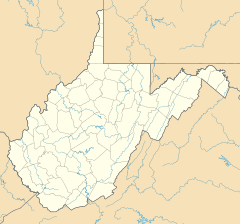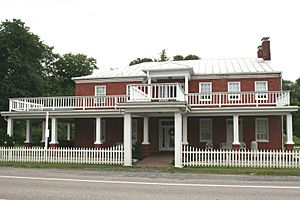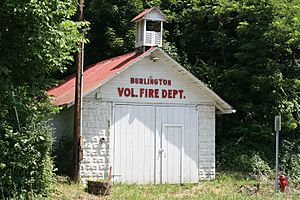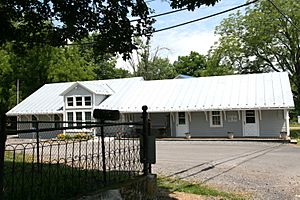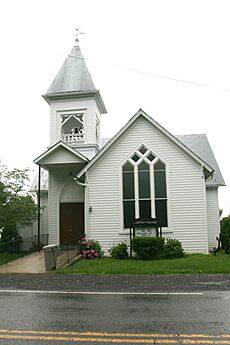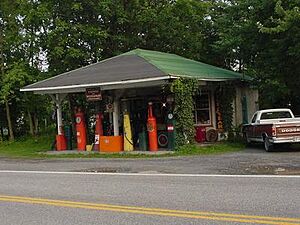Burlington, West Virginia facts for kids
Quick facts for kids
Burlington
|
|
|---|---|
|
Census-designated place (CDP)
|
|
| Country | United States |
| State | West Virginia |
| County | Mineral |
| Area | |
| • Total | 1.226 sq mi (3.18 km2) |
| • Land | 1.226 sq mi (3.18 km2) |
| • Water | 0 sq mi (0 km2) |
| Elevation | 751 ft (229 m) |
| Population
(2020)
|
|
| • Total | 131 |
| • Density | 106.9/sq mi (41.26/km2) |
| Time zone | UTC-5 (Eastern (EST)) |
| • Summer (DST) | UTC-4 (EDT) |
| ZIP codes |
26710
|
| GNIS feature ID | 2586776 |
Burlington is a small community, also called a census-designated place (CDP), in Mineral County, West Virginia, United States. It is located along U.S. Route 50, which is also known as the Northwestern Turnpike. This road crosses Pattersons Creek here. In 2020, about 131 people lived in Burlington. It is part of the larger Cumberland, MD-WV area.
Contents
Fun Festivals in Burlington
Burlington is famous for its Old Fashioned Apple Harvest Festival. This festival started in 1973. It has become the biggest celebration of its kind in the Eastern Panhandle of West Virginia. You can enjoy this fun event every year on the first weekend of October.
Burlington's History
Burlington is located along the old Northwestern Turnpike (US 50). This area is in the southeastern part of Mineral County, West Virginia. German and English settlers started moving to Burlington in the early 1700s. This happened after Thomas, Lord Fairfax surveyed the Patterson Creek Manor in 1738.
How Burlington Grew
The village of Burlington began to grow around the early 1800s. Several mills were built along Mill Creek and Patterson Creek. These mills brought more business to the area. The Burlington Post Office opened on September 24, 1827.
The building of the Northwestern Turnpike through Burlington in 1831 helped the town grow even more. It became an important center for trade in the region. Many beautiful old houses in the village were built during this time. This was a period of good economic growth. One of the oldest houses, the Homestead, was built as a tavern. It served travelers on the stagecoach route along the turnpike. John and Ruth Ann Vandiver built the Homestead. It continued to be an inn and restaurant until the mid-1900s.
Burlington During the Civil War
During the American Civil War, several small battles happened in or near Burlington. At least six skirmishes took place in 1861 and 1863. Union and Confederate forces fought here. For example, the Ringgold Cavalry of Pennsylvania fought Confederate forces in 1861 and 1863.
On August 4, 1863, the Union Washington County Cavalry fought near the town. Another Union group, the LaFayette County Cavalry, fought nearby on October 13, 1863. On November 16, 1863, Union soldiers fought Confederate forces about three miles south of town. Three Union soldiers were killed in this skirmish.
Helping Children in Burlington
In 1913, Dr. F.L. Baker and Rev. F.C. Rollman started the Star of Hope Child Refuge. This was a home and school for children who had lost their parents. It helped them avoid being sent to a county poor farm. From 1950 to 1993, it was known as the Burlington United Methodist Children's Home. Today, it is called Burlington United Methodist Family Services, Inc. The center has homes and classrooms in Burlington. They also have facilities in Keyser and Beckley.
Burlington Today
Burlington is still a rural farming community. The Burlington Historic District was added to the National Register of Historic Places in 1992. This district includes about 25 historic homes and businesses.
Important Historic Sites
- The Homestead (built around 1831): This is a brick house built in the Federal style. John and Ruth Ann Vandiver built it as a tavern along the Northwestern Turnpike. It was later expanded.
- The Vandiver House (built in 1881): This brick and frame house was designed in the Queen Anne style. Captain John and Jane Vandiver built it.
- Union Church (built around 1892): The first church in Burlington was a log building from the early 1800s. It was used by the Patterson Creek Baptist Church. A new church, the "Free Church," replaced it in 1854. This church was used by several groups. In 1892, the Methodist Episcopal Church and the Presbyterian Church built a new church. This is the Union Church you see today. It is made of wood and built in the Gothic Revival style.
- Twin Mountain and Potomac Railroad Station (built in 1911): This building was once a freight station for the Twin Mountain and Potomac Railroad. This railroad carried fruit from nearby orchards to Keyser. It has also served as the post office. Today, it is a branch of the Keyser-Mineral County Library. This station is the only building left from that short-lived railroad.
- Weaver's Service Station (early 1900s): At Weaver's Antique Service Station, you can see what gas stations were like in the past. It operated as a service station until 1985. Now, it is like a living museum. It has old gas pumps, pedal cars, and other items from old service stations.
Other historic places near Burlington are Carskadon House, Fairview, Fort Hill, and Travelers Rest. All of these are also listed on the National Register of Historic Places.
See also
 In Spanish: Burlington (Virginia Occidental) para niños
In Spanish: Burlington (Virginia Occidental) para niños


